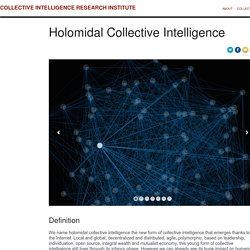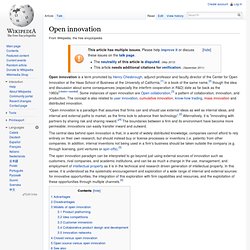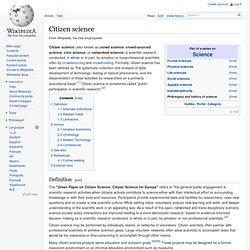

Collective Intelligence Research Institute. We name holomidal collective intelligence the new form of collective intelligence that emerges thanks to the Internet.

Local and global, decentralized and distributed, agile, polymorphic, based on leadership, individuation, open source, integral wealth and mutualist economy, this young form of collective intelligence still lives through its infancy phase. However we can already see its huge impact on humanity where more and more people in civil society self-organize in order to address societal issues that pyramidal collective intelligence cannot address and even provokes.
Socialware and communityware serve as the keystone on which collectives can rely on, in order to self-organize and scale up, locally and remotely. Holomidal collective intelligence will soon build advanced forms of holopticism and augmented holopticism. L'intelligence collective holomidale. Dans cette video, Jean François Noubel, chercheur en intelligence collective au CIRI (Collective Intelligence Research Institut), partage sa passion et sa discipline, l'intelligence collective sous la forme de conférence avec des cadres de la SNCF.

L'intelligence collective relève d'une propriété du vivant sociale et elle devient, d'une manière récente, une science qui cherche à comprendre la structure des organisations collectives (atouts, limites, fonctionnement) et leurs évolutions futures. Jean François Noubel met en lumière l'intelligence collective holomidale. Les 4 grands types d'intelligence collectiveSelon Jean François Noubel, les quatre grands type d'intelligence collective sont : L'intelligence collective en essaim. Groupement de poissons ou d'oiseaux où troupeaux d'animaux sauvages, termitières, de plusieurs milliers d'individus qui ont peu de liberté individuelle mais possèdent une force de groupe à l'échelle collective. Source : 4emesinge.com. Web de demain : l’intelligence collective selon Pierre Lévy.
Lorsque l’on s’intéresse à l’Internet, on se rend rapidement compte que ce n’est pas une technologie comme les autres.

Pour certains, l’Internet a même une valeur et un potentiel anthropologiques. En ce sens, l’Internet tendrait donc à représenter l’Humain sous tous ses aspects, à travers une synthèse des différentes sciences humaines et naturelles. (Il est intéressant de noter que le terme anthropologie vient de deux mots grecs, "anthrôpos" qui signifie homme au sens générique, et "logos" qui signifie « parole », « discours ».) C’est en tout cas sur ce principe que Pierre Lévy fonde le concept d’intelligence collective, dès 1994, notamment dans son ouvrage L’Intelligence collective : pour une anthropologie du cyberespace. Pierre Lévy, au Brésil, en 2009 Toutefois, il estime que l’intelligence collective n’est en aucun cas un concept nouveau, mais a déjà été pensée par des philosophes du passé, et c’est son cheminement que je vais tenter de vous décrire à présent… La tradition Fârâbienne.
Open innovation. Open innovation is a term promoted by Henry Chesbrough, adjunct professor and faculty director of the Center for Open Innovation at the Haas School of Business at the University of California,[1] in a book of the same name,[2] though the idea and discussion about some consequences (especially the interfirm cooperation in R&D) date as far back as the 1960s[citation needed].

Some instances of open innovation are Open collaboration,[3] a pattern of collaboration, innovation, and production. The concept is also related to user innovation, cumulative innovation, know-how trading, mass innovation and distributed innovation. “Open innovation is a paradigm that assumes that firms can and should use external ideas as well as internal ideas, and internal and external paths to market, as the firms look to advance their technology”.[2] Alternatively, it is "innovating with partners by sharing risk and sharing reward. Advantages[edit] Disadvantages[edit] Models of open innovation[edit] See also[edit] Citizen science. Citizen science (also known as crowd science, crowd-sourced science, civic science, or networked science) is scientific research conducted, in whole or in part, by amateur or nonprofessional scientists, often by crowdsourcing and crowdfunding.

Formally, citizen science has been defined as "the systematic collection and analysis of data; development of technology; testing of natural phenomena; and the dissemination of these activities by researchers on a primarily avocational basis".[1] Citizen science is sometimes called "public participation in scientific research. "[2] Definition[edit] The "Green Paper on Citizen Science: Citizen Science for Europe" refers to "the general public engagement in scientific research activities when citizens actively contribute to science either with their intellectual effort or surrounding knowledge or with their tools and resources. Design Thinking.